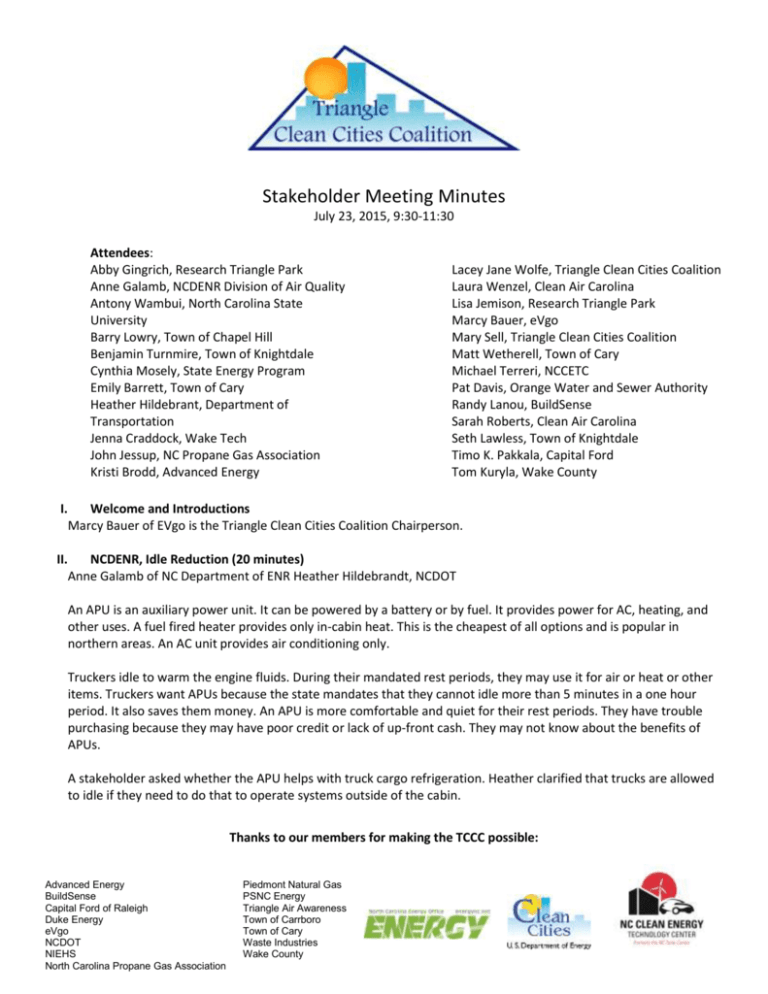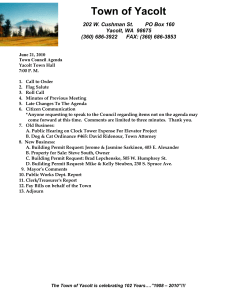July 23, 2015
advertisement

Stakeholder Meeting Minutes July 23, 2015, 9:30-11:30 Attendees: Abby Gingrich, Research Triangle Park Anne Galamb, NCDENR Division of Air Quality Antony Wambui, North Carolina State University Barry Lowry, Town of Chapel Hill Benjamin Turnmire, Town of Knightdale Cynthia Mosely, State Energy Program Emily Barrett, Town of Cary Heather Hildebrant, Department of Transportation Jenna Craddock, Wake Tech John Jessup, NC Propane Gas Association Kristi Brodd, Advanced Energy Lacey Jane Wolfe, Triangle Clean Cities Coalition Laura Wenzel, Clean Air Carolina Lisa Jemison, Research Triangle Park Marcy Bauer, eVgo Mary Sell, Triangle Clean Cities Coalition Matt Wetherell, Town of Cary Michael Terreri, NCCETC Pat Davis, Orange Water and Sewer Authority Randy Lanou, BuildSense Sarah Roberts, Clean Air Carolina Seth Lawless, Town of Knightdale Timo K. Pakkala, Capital Ford Tom Kuryla, Wake County I. Welcome and Introductions Marcy Bauer of EVgo is the Triangle Clean Cities Coalition Chairperson. II. NCDENR, Idle Reduction (20 minutes) Anne Galamb of NC Department of ENR Heather Hildebrandt, NCDOT An APU is an auxiliary power unit. It can be powered by a battery or by fuel. It provides power for AC, heating, and other uses. A fuel fired heater provides only in-cabin heat. This is the cheapest of all options and is popular in northern areas. An AC unit provides air conditioning only. Truckers idle to warm the engine fluids. During their mandated rest periods, they may use it for air or heat or other items. Truckers want APUs because the state mandates that they cannot idle more than 5 minutes in a one hour period. It also saves them money. An APU is more comfortable and quiet for their rest periods. They have trouble purchasing because they may have poor credit or lack of up-front cash. They may not know about the benefits of APUs. A stakeholder asked whether the APU helps with truck cargo refrigeration. Heather clarified that trucks are allowed to idle if they need to do that to operate systems outside of the cabin. Thanks to our members for making the TCCC possible: Advanced Energy BuildSense Capital Ford of Raleigh Duke Energy eVgo NCDOT NIEHS North Carolina Propane Gas Association Piedmont Natural Gas PSNC Energy Triangle Air Awareness Town of Carrboro Town of Cary Waste Industries Wake County When developing the legislation to limit idling, they decided to provide a rebate to assist truckers in the transition. There is no penalty for those who violate the law. There is a complaint website where people can report violators. It’s hard to get all of the information necessary. This is where the information is on the website: http://daq.state.nc.us/motor/idle/ Assumptions: Long Haul Truck States: 6 mpg, 180,000 miles per year. 32727 gallons of diesel per year. According to the American Trucking Association 8% savings in fuel with an APU. New APU is $11,000. 20-month payback. A used APU is $5,500; that has a 10-month payback. A battery APU costs $5,500 and has a 5 month payback. Fuel-fixed heater costs $2,500 and has a 2-month payback. They spoke to the Florida DEP for best practices. At first, they gave free APUs but had too much demand. Limited to 6 per company to help out the owner-operators. Before starting the program, they were concerned that no one would come. They shouldn’t have worried. They still get calls about APUs. Word of mouth was the best method. NCDENR worked with dealers. It seemed that if one wellconnected person received an APU rebate, then all of his friends wanted a rebate. In 2009, it was funded by USEPA stimulus funds. In 2010 is was funded by non-ARRA EPA funds. In 2013, funding continued. For one auxiliary unit: APU Fuel-fixed Heater Battery AC Unit NOX 1.007 .389 PM2.5 .024 .011 CO2 43.8 21.1 Fuel 8% < 4% .397 .011 22.2 < 4% Overall, they’ve given out 247 APU rebates. They spent $816,000. They save well over 1 million gallons of fuel per year. Trucks are mandated to rest 10 hours per day. Many idle for most of this time period, depending on weather conditions and vehicle loads. III. Town of Chapel Hill (20 minutes) Barry Lowry oversees about 500 vehicles in the Town of Chapel Hill public works. This does not include their transit system. Sometimes, they’re prohibited from turning off some equipment. Some of the things that fleet services does is measuring performance. They calculate their GHG emissions to be 1475 annually. The goal was to limit is to 1600. They’ve had to defer replacements since 2009. They want from purchasing $1.6 million in rolling assets per year, to half that number. In 2009, they had 5 police vehicles with over 100k miles. In 2014, they had 25 vehicles with over 100k. Now, they’re back to performing and purchasing vehicles the way they prefer to do. To institute an idle reduction program, you need commitment form the top down. You need to promote and enforce the concept of idle reduction. Supervisors, laborers, operators, all need to be on board. In the past 4-5 years, they Thanks to our members for making the TCCC possible: Advanced Energy BuildSense Capital Ford of Raleigh Duke Energy eVgo NCDOT NIEHS North Carolina Propane Gas Association Piedmont Natural Gas PSNC Energy Triangle Air Awareness Town of Carrboro Town of Cary Waste Industries Wake County created an operating manual for every vehicle. It speaks to the regulating of idle times. It informs the driver of idle times and other stipulations. The Town’s policy speaks to idling. The purpose is to reduce fuel used, save costs, and reduce emissions. In general, once a vehicle is stationary for 2 minutes, it should be turned off. They have exemptions by their own regulations. For example, fire trucks are exempt. They have disciplinary actions spelled out in the policy. A very involved citizenry reports violators. The Town does enforce the policy. They don’t run into very many folks who do violate the policy. The hardest part to implement was in making it practical. How do you make the goals of the town important to a supervisor, a mechanic, an operator? Barry provided two pictures. One 100k vehicle was sold, writing on the side said “no gas tank included.” That vehicle was used up so they broke it down for parts. The other picture was a vehicle that was 8 years old when sold, probably around 65k, and it was sold for $8,000 and brought revenue back to the town. The Town allows the 30-35 have Idleright technology on them. Those units were quite inexpensive. The car will idle for a few minutes. Then it will automatically shut off but continue to operate lights and other essential functions. They also added GPS to the fleet. About 45 vehicles have it. Part of that package is that it monitors idling. They get a daily report on idling. They have set parameters for idling. They don’t give punitive actions, but they’ll say, “your department is over the parameters for idling. Can you please get it back into the parameters?” Over the past several years, technology in vehicles has skyrocketed. Most every mechanic has a laptop for their tool of choice. The vehicles have on-board computers and diagnostics. The computer is how you diagnose which part of the vehicle is sick. Mechanic training is important but expensive. They have converted many of their police vehicles to flex fuel. 100 vehciles. They now purchase more E85 than unleaded for their police fleet. Their goal is to become 100% green by 2020. They’re currently at 75%. To become green at 100%, there is a financial component. They consider an hour of idle time to equal 25 miles driven. Since 2008, the average age of vehicles have increased from 5.5 years to 7.2 years. During that same time frame, their average annual maintenance expenditure has increased by approximately 30%. The towns GHG emissions has reduced by 50% in that same time. Constantly informing and educating is important, to the point that they get tired of hearing about it. Over the past 56 years, they’ve got the handle of it. The supervisor chooses what the action is. First is verbal, second is written, the third is suspension (3 days off, no pay). IV. Announcements (10 minutes) Lacey Jane Wolfe and Mary Sell, Triangle Clean Cities Coalition Triangle Clean Cities Coalition has secured a new grant. That has been executed. The grant is called Southeast AFV Demonstration Initiative (SADI). Thanks to our members for making the TCCC possible: Advanced Energy BuildSense Capital Ford of Raleigh Duke Energy eVgo NCDOT NIEHS North Carolina Propane Gas Association Piedmont Natural Gas PSNC Energy Triangle Air Awareness Town of Carrboro Town of Cary Waste Industries Wake County V. Stakeholder Updates Capital Ford stated that the new F250s and F350s have hardened valves and are ready to be converted to propane. The Town of Knightdale converted 10 cars to propane. They’re down to 4 now. They’re examining ways to expand the program with new vehicles. They’ve most to the Ford Interceptor. Durham County hired a new fleet manager. All vehicles are owned by individual departments. This person is conducting an analysis of all vehicles. NC Clean Tech Center is hosting a clean vehicle tour in October 20-22. They’re also modeling for the USEPA to determine emission reductions. NC State University is still working on installing electric vehicle charging stations. They are also developing an RFP for their paratransit contractor. They encouraged use of B20. It’s a trade-off between cost and benefit. Orange Water and Sewer Authority is setting an energy policy. They’re looking at options for renewable fuel sources. They’re conducting a feasibility analysis. They need to find an end user who would be interested in using the fuel produced. Recently, they used reports from the Interagency Working Group on the Social Costs of Carbon. North Carolina Propane Gas Association is excited about a new fuel nozzle. It’s called the Staubli ultra-low emission adapter. They’re no sound or gas smell when disconnecting. National will provide a rebate for those who already have the old system. This makes fueling with propane much easier. NCDENR There will be another DERA grant this fall. It will be $300,000 for the whole state. It can be used for anything that runs on diesel that moves. NCDOT just closed the CMAQ call for projects. This will now be annual. Advanced Energy will be hosting a series of events for National Drive Electric Week. They just kicked off their electric vehicle charging station usage study. They will be working with Chipley consulting. They hope it will be completed by October for the Task Force Summit on October 21. Wake Tech is increasing their number of preferred parking spots for low-emission vehicles. Those are spread across several campuses. They also have preferred spots for carpoolers. The Town of Cary has a strategic energy action plan. They’re going to update the council this year on their progress. They’re interested in hearing from other stakeholders about life-cycle periods. Usually, a 5-year cycle does not justify the cost of hybrids. They are also curious about what cost justifies GHG reductions. Another stakeholder is also weighing this question. Everyone should like the Town of Cary Facebook page. A stakeholder noted that all hybrids usually have an 8-year, 100k warranty. So that might justify changing the period to 8 years. They are also closing out their CFAT grant. They had purchased APUs, GPS and telematics. They’d love to share data and lessons learned at one of the future meetings. In general, it was a 12% increase in mpg so far. Thanks to our members for making the TCCC possible: Advanced Energy BuildSense Capital Ford of Raleigh Duke Energy eVgo NCDOT NIEHS North Carolina Propane Gas Association Piedmont Natural Gas PSNC Energy Triangle Air Awareness Town of Carrboro Town of Cary Waste Industries Wake County EVgo will have an announcement in the next week or two. Triangle Clean Cities Coalition will send the announcement out when it comes. EVgo will participate in the September Drive Electric week and the Clean Vehicle tour. Nexus EMC is conducting feasibility studies around a variety of technologies and fleets to analyze re-world results. One is an autonomous tractor. This helps them save a lot of fuel, gives ROI of a year or less. This can save $600-700k per year with one vehicle. Another shuttle bus has very good results, reducing the ROI significantly. Blue Gas Marine converts marine vessels to CNG. They have projects in California, Florida, and Brazil. BuildSense continues to operate their CNG vehicles. They won a CFAT grant to convert 3 more vehicles to CNG. They have a full-size transit on order. They continue to use biodiesel, but now have the tank be mobile. They can fuel diesel equipment on site. They continue to have severe maintenance issues with their non-prepped CNG vehicles. They’ve rebuilt two engines that had 75k and 80k miles on them. Very little support form the manufacturer. They’ll continue to align their vehicle fleet with their operations. Clean Air Carolina is a non-profit advocacy organization. Laura Wenzel is the local point person. They have a history of working on clean transportation projects. They’re trying to branch out across the state. They’re following a lot of legislation right now. They’re worried about the removal of idle-reduction laws. Also, House Bill 169 would remove some counties from emissions inspections. Our next stakeholder meeting will be Thursday, September 24, 2015, from 9:30 to 11:30 at 4307 Emperor Boulevard, Suite 110, Durham 27703 Thanks to our members for making the TCCC possible: Advanced Energy BuildSense Capital Ford of Raleigh Duke Energy eVgo NCDOT NIEHS North Carolina Propane Gas Association Piedmont Natural Gas PSNC Energy Triangle Air Awareness Town of Carrboro Town of Cary Waste Industries Wake County







